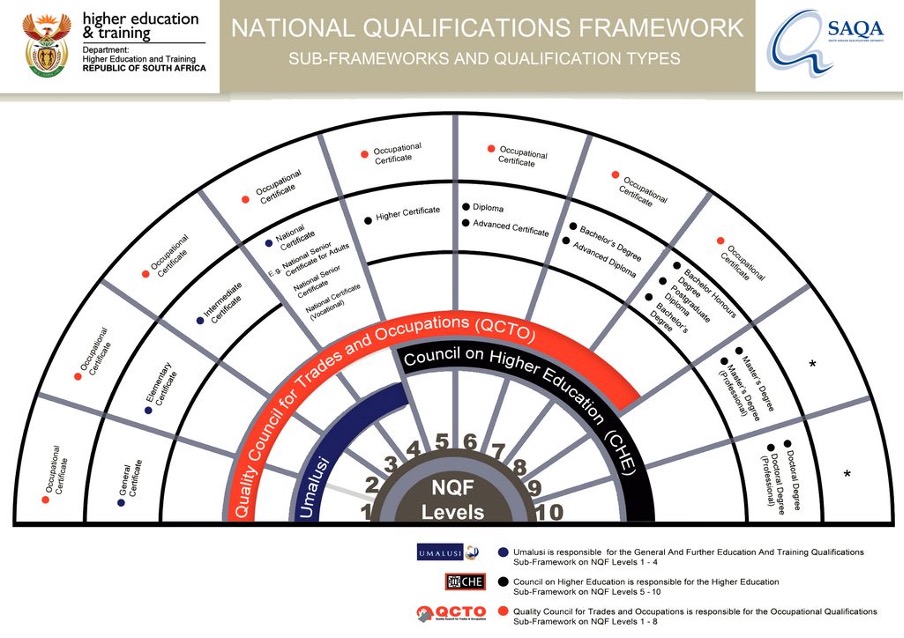The National Qualifications Framework (NQF) in South Africa is a vital system that drives lifelong learning and the development of a skilled workforce. It serves as a comprehensive framework, integrating education and training to recognize acquired skills and knowledge across the country. The NQF provides opportunities for learners to accumulate credits leading to higher qualifications over time while promoting social equality, supporting career paths, enhancing quality education and addressing past inequalities. In this blog post, we will delve into how the NQF works towards achieving its objectives through its sub-frameworks, accreditation processes and quality assurance mechanisms.
What does the National Qualification Framework mean?
The National Qualifications Framework (NQF) in South Africa serves as a comprehensive and integrated framework that bridges the gap between education and training. It represents a national initiative aimed at promoting lifelong learning and the cultivation of a skilled and competent workforce. By encompassing various levels of education and training, the NQF ensures a seamless and interconnected system that supports continuous learning and development throughout individuals’ lives.
The NQF is designed to respond strategically to the ever-evolving influences of the external environment. It recognises the importance of adapting to societal and economic changes and aligning education and training accordingly. By embracing a lifelong learning approach, the NQF emphasises the ongoing development and upskilling of individuals throughout their lives. It recognises that learning is not limited to formal educational institutions but occurs in various contexts, including the workplace and community settings.
The NQF is a collaborative endeavour that brings together people from diverse socio-economic backgrounds. It encourages active participation and engagement from various stakeholders, including learners, educators, employers, and policymakers. Through this collaborative effort, the NQF seeks to negotiate and define quality outcomes-based education and training in South Africa. It recognises that quality education and training are social constructs that require input from all relevant parties to ensure that the system effectively meets the needs of individuals and the broader society.
What is the purpose of the national qualification framework?
The NQF has multiple objectives, all aimed at fostering individual and societal development. Firstly, it seeks to contribute to the holistic development of learners by providing a comprehensive framework for their educational journey. This includes not only the acquisition of knowledge and skills but also the personal growth and well-rounded development of individuals. What’s more, the NQF aims to promote the overall social and economic progress of the nation by nurturing a skilled and competent workforce.
One of the key objectives of the NQF is to establish a unified national framework for learning achievements. By doing so, it ensures that education, training, and career paths are accessible and that individuals can progress and move between different levels seamlessly. This promotes mobility within the education system and the broader workforce, enabling individuals to pursue further education, seek new career opportunities, or make lateral transitions across various sectors.
The NQF also endeavours to enhance the quality of education and training throughout South Africa. It sets standards and benchmarks for qualifications, ensuring that they meet specific criteria of excellence and relevance. This focus on quality helps to improve the overall educational landscape and ensures that learners receive education and training that is aligned with national standards.
Within the NQF, qualifications, part qualifications, and skills programs are registered at specific levels. This allows learners to accumulate credits as they successfully complete unit standards or modules. The accumulation of credits serves as a pathway for learners to progress towards higher qualifications over time. The Policy for Credit Accumulation and Transfer (CAT) further facilitates this progression by promoting the smooth transition between qualifications within and across the three sub-frameworks of the NQF. This policy aims to improve access to employment opportunities by recognising and valuing the credits earned by individuals, thus enabling them to showcase their skills and qualifications to potential employers.
How Does the National Qualification Framework Work?
The NQF is structured into ten levels, each designed to represent different degrees of complexity, depth, and specialisation. These levels serve as a measure of the knowledge and skills acquired by learners at various stages of their education and training. Accompanying each level are descriptors that provide clear guidelines regarding the expected knowledge, skills, and competencies associated with qualifications at that particular level. These descriptors offer a comprehensive understanding of the learning outcomes that learners should achieve upon completing a qualification.

The NQF operates through three coordinated qualifications sub-frameworks, ensuring comprehensive coverage across all levels. The first sub-framework is the General and Further Education and Training Sub-Framework (GFETQSF), which caters to learners pursuing general education, as well as vocational and technical training. It encompasses the initial levels of the NQF, from entry-level qualifications to those attained after completing secondary education. The GFETQSF focuses on equipping learners with a broad range of foundational knowledge and skills.
The second sub-framework within the NQF is the Occupational Qualifications Sub-Framework (OQSF). This sub-framework addresses the specific qualifications and skills required for various occupations and trades. It covers a broader range of levels, extending beyond the initial stages of education and training. The OQSF encompasses qualifications from entry-level occupational certificates to highly specialised professional certifications.
The third sub-framework is the Higher Education Qualifications Sub-Framework (HEQSF), which caters to tertiary education and advanced academic qualifications. This sub-framework covers levels typically associated with bachelor’s degrees, postgraduate diplomas, master’s degrees, and doctoral degrees. The HEQSF provides a structured pathway for learners pursuing higher education and research-based qualifications.
By dividing the NQF into these three coordinated sub-frameworks, South Africa ensures a comprehensive coverage of qualifications across all levels of education and training. This approach enables learners to progress seamlessly through the different sub-frameworks, acquiring the necessary knowledge, skills, and competencies relevant to their chosen fields of study or occupation.
The National Qualifications Framework and Quality Assurance Mechanisms
To maintain the standards and relevance of qualifications within the National Qualifications Framework (NQF), robust quality assurance mechanisms are incorporated. These mechanisms encompass various processes such as accreditation, assessment, and ongoing monitoring and evaluation. Educational institutions undergo rigorous accreditation processes to ensure that they meet the required standards set by the NQF.
To oversee and implement quality assurance in the NQF, three Quality Councils have been established. UMALUSI is responsible for the General and Further Education and Training Sub-Framework (GFETQSF) covering NQF levels 1 to 4. The Quality Council for Trades & Occupations (QCTO) is responsible for the Occupational Qualifications Sub-Framework (OQSF), encompassing NQF levels 1 to 8. The Council on Higher Education South Africa (CHE) is entrusted with quality assurance for the Higher Education Qualifications Sub-Framework (HEQSF), covering NQF levels 5 to 10. These Quality Councils play a vital role in developing and implementing policies for quality assurance within their respective sub-frameworks, ensuring the integrity, credibility, and standardisation of qualifications throughout the NQF.
National Learners’ Records Database
The National Learners’ Records Database (NLRD) acts as a centralised repository of data related to education and training within the NQF. It captures and stores information about learners, their qualifications, credits earned, and other relevant details. This comprehensive database enables authorised stakeholders, such as educational institutions, employers, and regulatory bodies, to access accurate and up-to-date information about learners and their educational achievements.
By having a centralised database like the NLRD, the management of the NQF becomes more streamlined and efficient. It allows for easy tracking of learner progress, credit accumulation, and qualification attainment. Educational institutions can use this information to monitor the academic journey of their students, identify areas for improvement, and make informed decisions regarding curriculum development and support services.
The NLRD also plays a crucial role in providing accurate reporting on various aspects of South Africa’s education and training system. The data stored in the NLRD can be analysed to generate comprehensive reports and statistical information, with the reports informing policymakers, researchers, and other stakeholders about the performance, trends, and effectiveness of the education and training sector.
Conclusion
The National Qualifications Framework plays a vital role in promoting lifelong learning and the development of a skilled workforce in South Africa. With its ten levels, three sub-frameworks, and quality assurance mechanisms, the NQF ensures comprehensive coverage across all educational sectors while maintaining standardisation and credibility. The National Learners’ Records Database further facilitates efficient management of the NQF by enabling easy tracking of learner progress and accurate reporting on various aspects of South Africa’s education and training system. As such, the NQF remains an essential tool for advancing education, training, and career opportunities throughout the nation.


